Let’s begin the Answer Arc. Couple of followup comments:
heattth: Loved your breakdown of themes. I found curious how you worded some of them, and there are some surprises. I look forward seeing how your understanding of those will change in the second half. Speaking of which. I don’t know if you realized or acknowledged it but “Answers Arc” is not actually the original subtitle. It is more of a fan term that was used in the translation for ease of understanding, I think (it actually sorta come from Higurashi. The actual subtitle of the second half is 散, Chiru (from the verb 散る). It means something like “scattering (of petals, leaves)” as you might know.
Oh, this is good to know! Indeed, I was not aware of this more poetic title. It makes me wonder what is being scattered. ‘Clues’ seems the most obvious interpretation, but we’ll see!
anarchistserum: I love your thoughts on motive!! I think you’re in the right mindset to go into the Answers arc with. Ugly theories are OK - murder is an ugly thing. Battler doesn’t like imagining any of his friends or family are capable of it. Anyone driven to murder another has certainly experienced ugliness.
Very true. Whoever is to blame, it must take something pretty horrific to make ‘murder someone’ make sense to them, let alone ‘murder everyone’.
quiza: I’ve been reading along with your liveblog as I play through Umineko. Finding your thoughts really interesting! also appreciate you calling out the misrepresentations of physics, since they are about as accurate in as the chess metaphors…
Hahaha… for what it’s worth, I forgive Ryuukishi’s dubious physics metaphors, because it gives me something fun to talk about.
Onwards, then, to the Scattering!
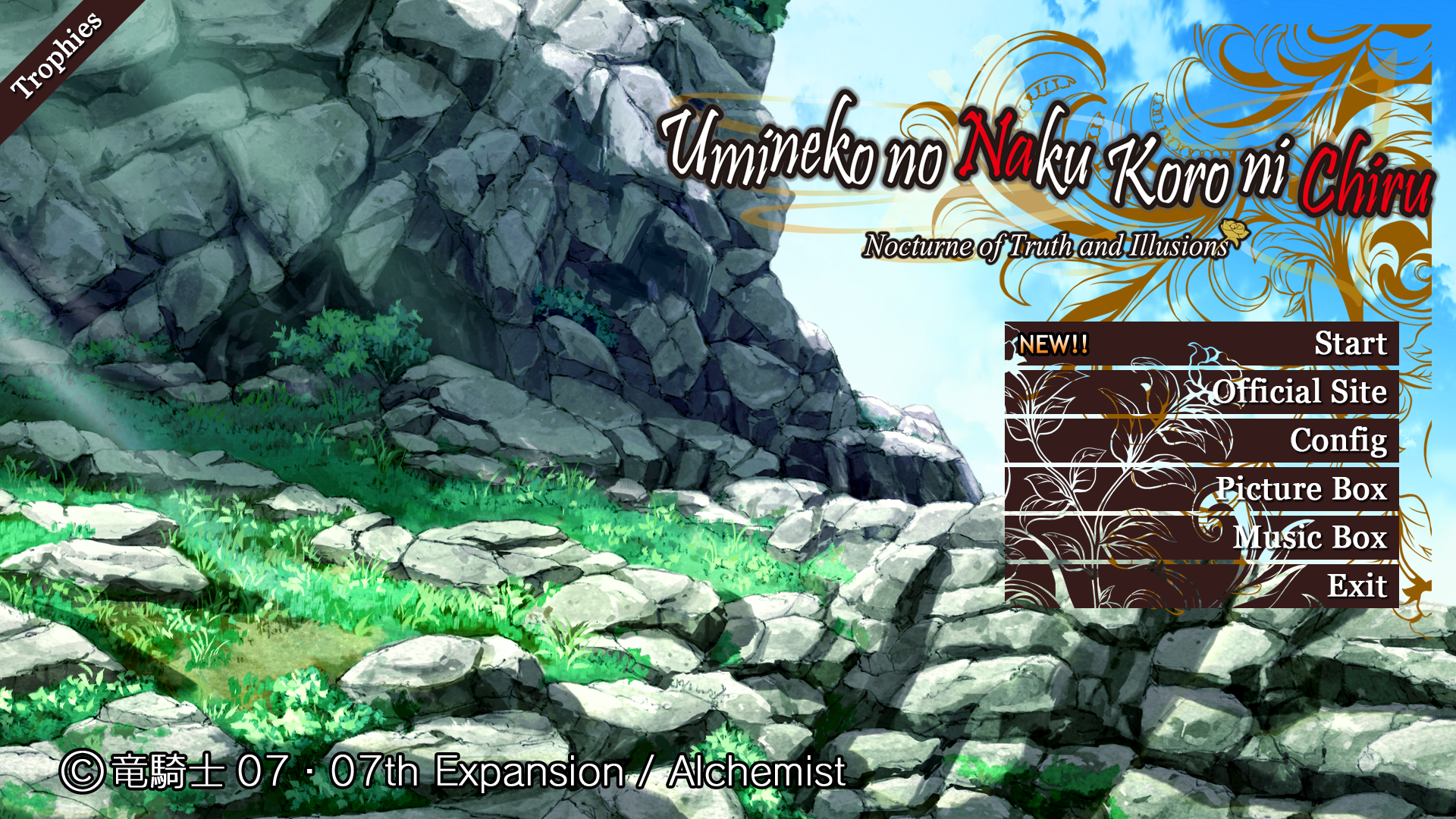
As soon as you click on ‘Episodes 5-8’ in Umineko Project, there is an evil laugh and the game performs some data caching, changing some hidden state. Then, you get a whole new menu screen, and the subtitle changes from Rondeau of the Witch and Reasoning to Nocturne of Truth and Illusions. (真実と幻想の夜想曲, the translation is pretty literal—incidentally the word 夜想曲 for ‘nocturne’ uses kanji for ‘night’, ‘idea/thought’ and ‘music’, which is a pretty fun gloss. Looking at the Japanese Wikipedia page, the term seems to refer specifically to the form in Western classical music. OK, tangent over!)
If you leave it idle for a little bit, a whole new opening plays, with a bunch of new characters and scenes. A bunch of characters have swords and early modern looking pistols, and there’s even an old sailing ship! All stuff that will likely be spoilers in retrospect, but I have no idea how to interpret any of this so it’s probably OK!
Episode 5 is titled End of the Golden Witch. The blurb for this one:
Good morning.
Please enjoy the new game, with its new Game Master.I say that, but the game has already reached its climax.
The culprit has been cornered, and merely awaits checkmate. I am sure there will be something you can spot from this clearer perspective.The difficulty is fairly easy.
What could possibly fool you now…?
Hmm, the fact that there are four entire episodes to go makes me think that somehow this isn’t telling the whole story!
OK, before I go in: the new Game Master thing makes me wonder if we’ll be telling a new story of ‘what happened on Rokkenjima’, or revisiting the previous games from a new perspective. I guess we’ll find out soon enough. Let’s go!
Right off the bat, Beatrice is calling us an idiot! Yay!
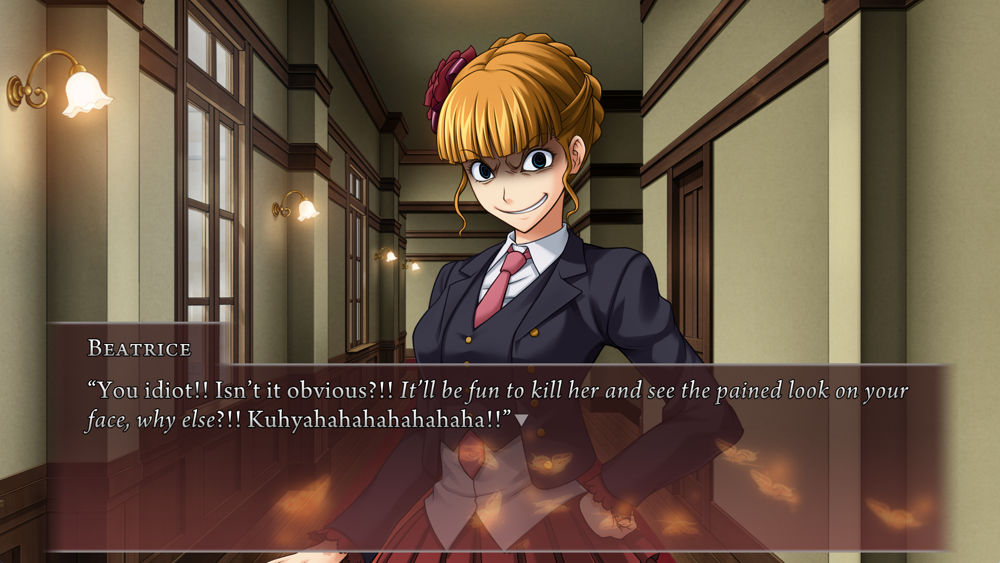
This is specifically Jacket!Beatrice. This may be a scene from Episode 2… ah in fact this is the beginning of a montage of previous Beatrice taunting scenes, transitioned with a breaking-glass effect. The third one of the set is about the tsundere routine.
And then, it’s back to the golden rose garden, once again with a purple sky. Beatrice, we are told, is sat with a doll-like affect before the game table. As Virgilia tends to the silent Beatrice, Battler is fiddling around with the chessboard considering the motivation of her moves.
We get a new version of the Beatrice talksprite with her hair down.
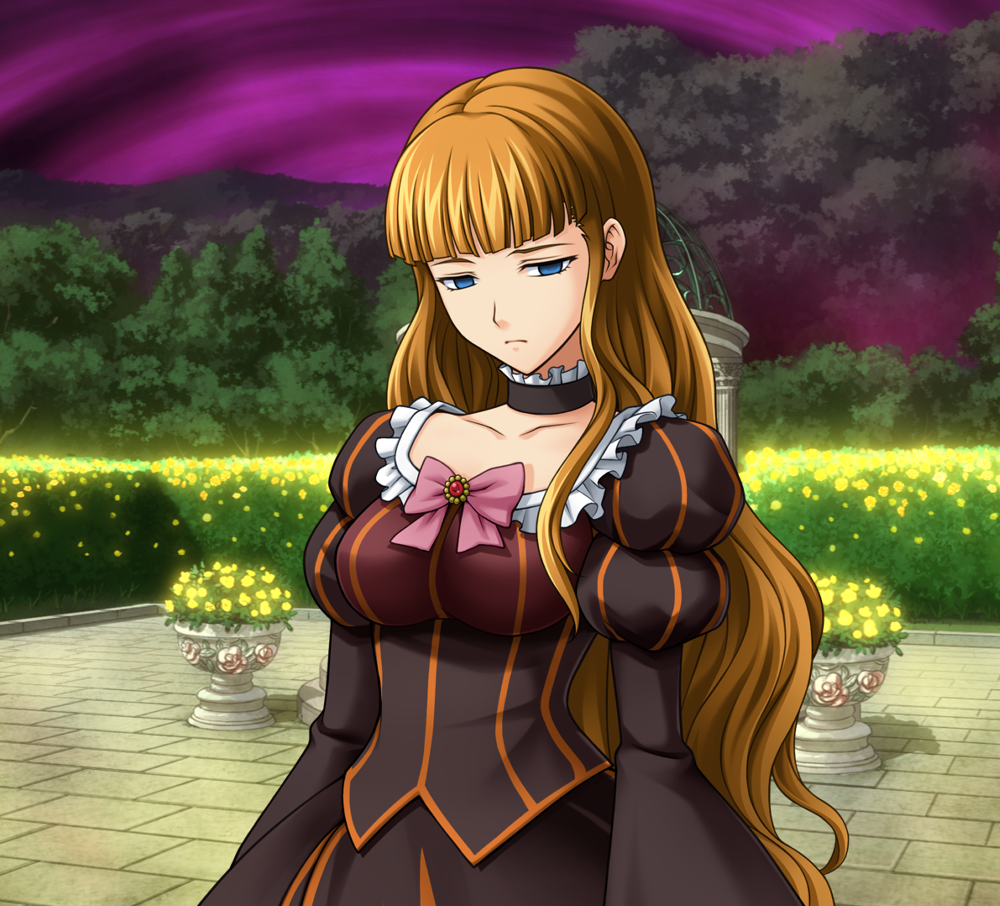
Virgilia finally decides to speak up as Battler’s questions get no more response. We are told that Battler is considering Beatrice’s moves, from the light of thinking that her goal is ‘the successful execution of a serial murder following an epitaph’. From that light, many of her moves seem to be counterproductive. But he’s determined to fulfil his promise to kill her.
Virgilia says that the next game has supposedly started, and we cut to the inside where we see Lambdadelta trying to appoint herself GM… as Beato’s assistant of course. Battler is not at all interested in playing against anyone besides Beato, but Bernkastel overrules him and approves the game to continue.
Battler repeatedly says ‘I don’t know who you two are’ or even ‘I don’t know what hole you two crept out of’—this latter seems to be translating the Japanese verb 湧いてきた referring to water gushing out or parasitic insects breeding. (Probably not important! But whenever the translators use an English idiom, I like to see where it came from, it’s fun.)
When Battler still won’t agree, Bernkastel ends up upping the emotional pressure, telling him that Ange will ‘always meet with miserable circumstances in an endless number of worlds’ if he refuses to play against Lambda… and if necessary she’ll make him watch her die again. A shot across the bows, I guess, in case we had any misguided sympathy with Bernie as our ‘good witch’!
She does say something pretty metaphysically interesting, though:
Bernkastel: ………If you step down from the game, this will become not just a fragment, but a definite reality. I won’t be the one to weave that future. You’ll do it yourself.
Something about the relationship of all the ‘fragments’ to the ‘Prime’ universe. If we can’t find an account of events where Battler lives, then… well, we’ll have proven that he was dead all along, I suppose.
Lambda remarks that Battler and Beato are only there to satisfy her boredom with their incomprehensible anger. Yep, be an immortal witch for long enough and you become more jaded than the most online-fried imageboard troll. Bernie promises she’ll support Battler ‘for all eternity, until I get bored’.
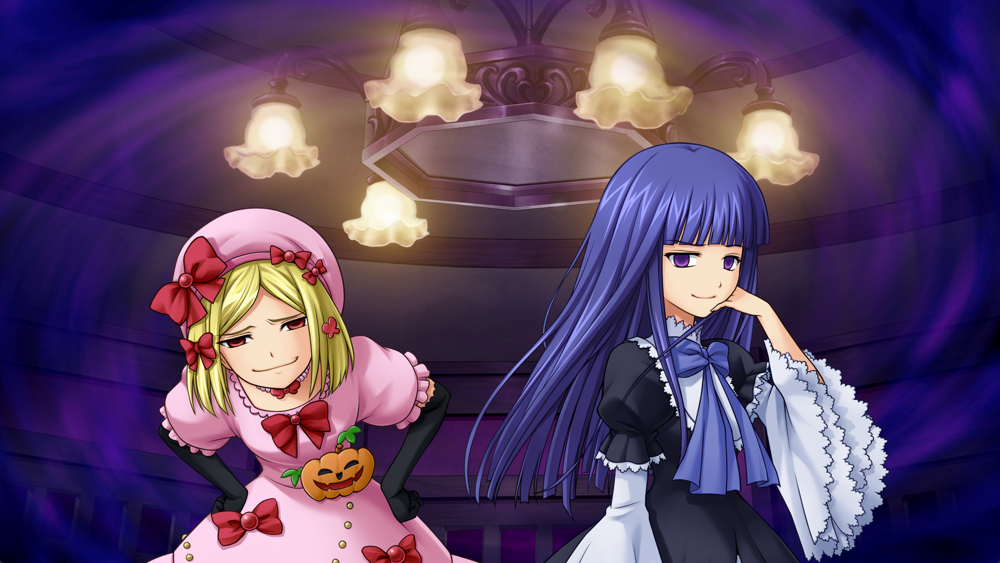
Do not invite these two to your D&D game under any circumstances!
Battler says they can start a game if they want to, but if Lambda can substitute to Beatrice, he’ll just let Bernie play for him. This is the first thing that actually bothers Lambda:
“What the heck?! Are you gonna just ignore this Episode 5 that I put so much effort into making?! Rude, ruuude!”
Bernkastel agrees to this, and so… damn, we’re going to get Umineko: Gamer GFs Edition this time around!
Lambda promises that her <hyper> <cute> kawaii version of Umineko will nevertheless stick to a Beato-ish atmosphere, and also include lots of bonus hints and red herrings.
Our POV, however, follows Battler out into the rose garden where he talks with Virgilia. She explains that, on Beatrice’s board, they can’t do anything she can’t, but they might do things she wouldn’t. Her example of this is a metaphor: you can’t play cards with a chess set, but you can throw them at your opponent or draw on the board. That would, however, be ‘blasphemy’ against the game of Chess.
Oh, fun. Let’s take a moment to talk about Penultima! It’s not particularly relevant, I just think it’s cool. Well, actually, it is kinda like Umineko in a way, come to think of it…
Penultima tangent
This is a game I used to play more than a decade ago now, with the Cambridge University Science Fiction Society. At the end of each term, we’d stay up all night playing board games, and Penultima was a mainstay (along with other similar inference games like Zendo).
Penultima is played with a chessboard, and occasionally other components. You have two players, and a set of ‘spectators’ whose job is to come up with a secret new rule to goven each piece, and a suitably suggestive name. For example:
- name
- Mirror
- replaces
- Rook
- move rule
- moves like a king, cannot take
- invoke rule
- swaps places with the piece on the other side of the board, reflected through the centre line
- taken rule
- no special rule
The players start out completely ignorant of the rules. On each player’s turn, they can ask a question to the relevant spectator like ‘can I move my Mirror to this row’ or ‘can I invoke my Werewolf’. If the answer is ‘yes’, they have now committed to do that, but they may need to ask further questions to narrow it down. Along with moves to any part of the board, the player has the option of ‘invoking’, which leaves a piece in-place and triggers a rule effect.
These actions may trigger further rule interactions. For example if you take a piece, you might activate whatever interaction that piece has on being taken; if there is any ambiguity the spectators can figure out between them how to resolve it. The game is won when the king-equivalent piece is taken.
Depending on the spectator and how energetic they feel, the rules might involve very complicated interactions, flavour text being announced, additional chessboards, additional tokens, really anything the players can think of.
After each game, spectators swap in for the next round. If the spectators feel that their rule hasn’t had the chance to shine, they may keep it in play, or retire it and come up with a new rule.
Playing penultima is a combination of an inference challenge for the players who must figure out what the rules are and a strategy to exploit them on the fly… and for the players, a game design challenge. To my mind, a good Penultima rule is simple enough to grasp in one game, doesn’t slow the game down too much, but also allows for potentially complex interactions with other piece rules.
So, back to Umineko… Battler is in a situation not entirely unlike a Penultima player, where he doesn’t know the rules, but he has to figure out a winning strategy.
A chessboard is simply an object that holds some sort of information state relevant to a game’s rules. This can be seen even more clearly with a Go board, which is simply a grid which holds nodes in one of three states. In fact, for the purely formal version of Chess, a board is not required. Players could simply name their moves in chess notation and picture the board in their minds. However, having an object to hold state and carry out computations makes the game a lot easier to play.
Just like cards, many other games can be played with a chessboard, like ‘fairy Chess’ or Penultima… or, with these two, perhaps something like ‘New Chess’ as in the skit above. So the question is, are Bernkastel and Lambda going to play ‘chess’ with this ‘chessboard’, or some other game? Since Beatrice did not disclose the rules that she was playing under, we can only guess.
My guess has been that Beatrice’s true goal was to build a framework to understand the events that took place on Rokkenjima that she was a witness to; that carrying out the murders in each scenario and obfuscating them with magic was just a means to that end. And she’s taken on some Suitsian voluntary obstacles in how she goes about that, so she doesn’t just sit down and tell Battler straight up.
Ronove wanders out to serve tea and says the first-twilight murders had already taken place. Wow, trust the gamer gfs to really speedrun this! Ronove sums up their game thus…
Ronove: It did not have…love.
So not so much like speedrunners, then! (Though it could also be very reasonably argued that the game that speedrunners are playing is a different game played with the same physical artefact, compared to playing the game casually.)
Ronove then corrects himself: ‘love’ is a feminine way to say it, but a masculine way is that it was ‘dishonorable’. What a fascinating dichotomy!
Ronove says that Lambda is following the rules precisely, but…
Mm. In Rules of Play chapter 21, Salen and Zimmerman discuss the phenomenon of rule-breaking. They offer a continuum of player behaviour from ‘standard players’ who follow the rules and norms and don’t take the game very seriously, ‘dedicated players’ such as hardcore wargamers or professional athletes who go to unusual efforts for formal mastery, ‘unsportsmanlike players’ who violate the nebulous unwritten rules of the game’s play culture and reject the lusory attitude, and then of course cheats and spoilsports. In this scheme, Battler and Ronove certainly value ‘dedicated play’, but Bernie and Lambda are not allowing the game to be played properly, undermining it by knocking away the scaffolding of norms that enable ‘meaningful play’ to emerge.
Though as Salen and Zimmerman discuss in the book, the boundaries are fuzzy and relative: what might be the ideal of dedicated play for one group might be unsportsmanlike tryhard behaviour in another. It all depends where the interest lies in a game for someone. No doubt for Bernie and Lambda, scrubs like Beato and Battler were never playing the game properly, and it’s about time some serious players took control.
Ronove’s gambit works, and Battler decides that he won’t let this stand: Beatrice created this game for him, and so he marches back in to take it back. But how? Is he going to take over the witch side? Now that would be a turn.
Virgilia encourages him to ‘discover some part of this child in their game without her’. Ah, so he’s just going to play versus Lambda, and not let Bernie play for him.
He comes back in at the endgame. We are taken to the character screen. By this point, six characters are marked dead, though from the sounds of things, there might be more, with the bodies not yet discovered. These are:
- Maria, Rosa, Jessica, George, Genji
-
Corpse discovered in the cousins’ room on the upper floor of the guesthouse [for Genji: in the servants’ quarters on the first floor of the mansion].
The direct cause of death is unknown, but her neck was sliced open by a sharp blade.
The wound was deep enough that anyone could easily confirm her death with absolute certainty. - Hideyoshi
-
Corpse discovered in a guest room on the first floor of the mansion.
He had been pierced through the back with a demon stake.
Its tip reached as far as his lungs.Because he was lying face-down on the bed, suicide must be ruled out.
So these six are presumably the first twilight. Curiously, Kinzo has a presence on the screen and is not marked dead, even though we now know he was dead all along.
We also have some different character screens on the Witch Side:
- Beatrice
-
The Golden Witch and the Endless Witch.
Beato’s piece, who represents the witch illusion.
Claims that the entire incident on Rokkenjima was caused by the witch illusion.
In the fifth game, she clashes with Bernkastel who denies this.Because she is no more than a piece and the higher-plane version of her has withdrawn from being the Game Master, she is not in a position to know the truth behind the fifth game.
This means she is in a different position than the one she held in previous games. - Bernkastel
-
The Witch of Miracles.
Also known as “the witch who knows that miracles don’t occur”.Participates in the fifth game as the player opposing Beato.
However, from the very beginning, her aim has been to deny the witch illusion. Her only goal is to destroy Beato and her world as a way to stave off boredom…Though she does deny the witch illusion, she is no ally of Battler’s.
- Lambdadelta
-
Serving as the fifth game’s Game Master in place of Beato, who stepped down from the position in the fourth game. Because of that, the story of the fifth game, while appearing ver ysimilar to previous games, is expected to turn out quite differently…
Just like Bernkastel, she has no lovoe for boredom, and might be friend or foe to Beato or Bern depending on the siutation.
- Battler
-
The man designated by Beato as her opponent during the first four games. Disgusted at how Lambdadelta took over as Game Master for the fifth game, he is not taking part in it as a player.
The rest of the Witch Side is unchanged from previous games; we have Virgilia, Ronove, Gaap and the Seven Sisters once again.
So Maria, Rosa, Jessica, George, Genji have had their throats cut, with all but Genji in the cousins’ room; Hideyoshi has been staked.
We join the game on the second day, October 5th 1986, and we get a montage of all the surviving characters in the parlour. The time is not specified. We are told that with one exception, everyone has been proven not to have killed anyone. Rudolf, Kyrie and Eva are accusing Natsuhi of being the culprit. And, with a sudden flash of lighting, “the girl” appears to accuse her.
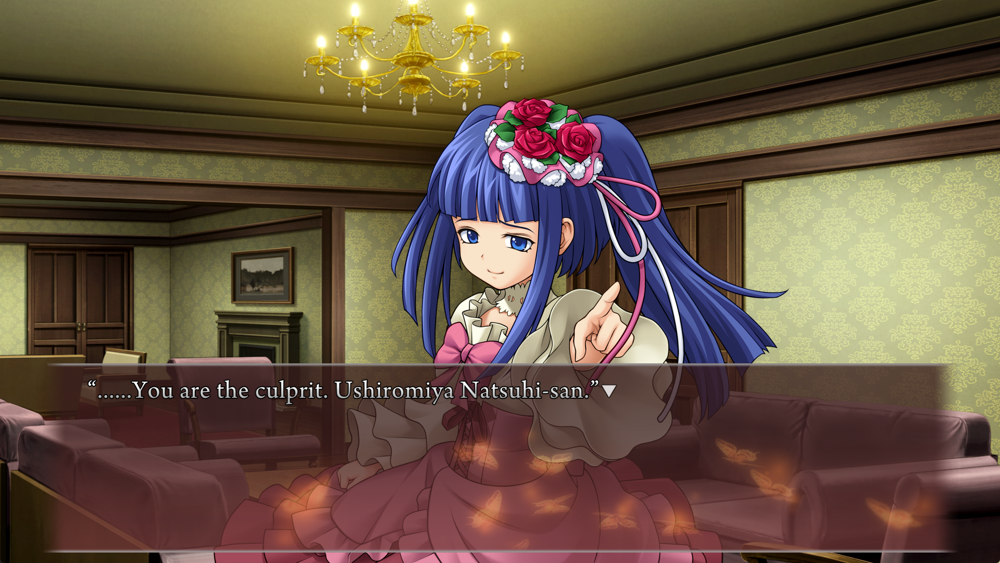
Bernkastel gets a piece?
And with that, the prologue ends, and an intro animation plays! It’s not the same as the video that plays on the main menu, and it has a different song, and mostly consists of motion graphics using the talksprites and CGs. Bernkastel and Lambdadelta feature prominently along with the familiar Ushiromiyas. There is a prominent effect of a big bubble over Rokkenjima getting shattered.
Chapter 1: Magic of Miracles
Chapter 1 then opens with Natsuhi banging on a door. So presumably we are rewinding to the beginning of the game.
So who’s this blue-haired girl? Well, she looks a lot like Bernkastel, so presumably Bernie gets an ‘avatar’ piece just like Battler? But how does that square with the 17 people on the island? Let’s find out.
Indeed, the question of Kinzo seems to be addressed right away. This appears to be the very moment of Kinzo’s death. Nanjo declares that he’s dead, and Krauss, Kumasawa and Genji are also present.
Krauss immediately starts complaining that Kinzo died too abruptly, and it was not possible to make ‘the proper arrangements’. They will need, everyone seems to understand, to make a big show of a funeral for Kinzo… and a show of strength on behalf of the Ushiromiya clan.
Natsuhi tells Krauss she is prepared to serve him until they both die. Gah. She delegates Genji to sort out the funeral. As for Nanjo, apparently an autopsy might also be necessary since he did not die in hospital—is that a law? Natsuhi implores him to keep it dignified and minimal.
Natsuhi internality moment: she feels Krauss is looking weak as he stays silent, so of course this means she needs to try harder to support him. Presumably, though, he’s hatching the ‘pretend Kinzo is alive’ plot…
Yep, there it is. He yells at them all to wait, and it gets larger text!
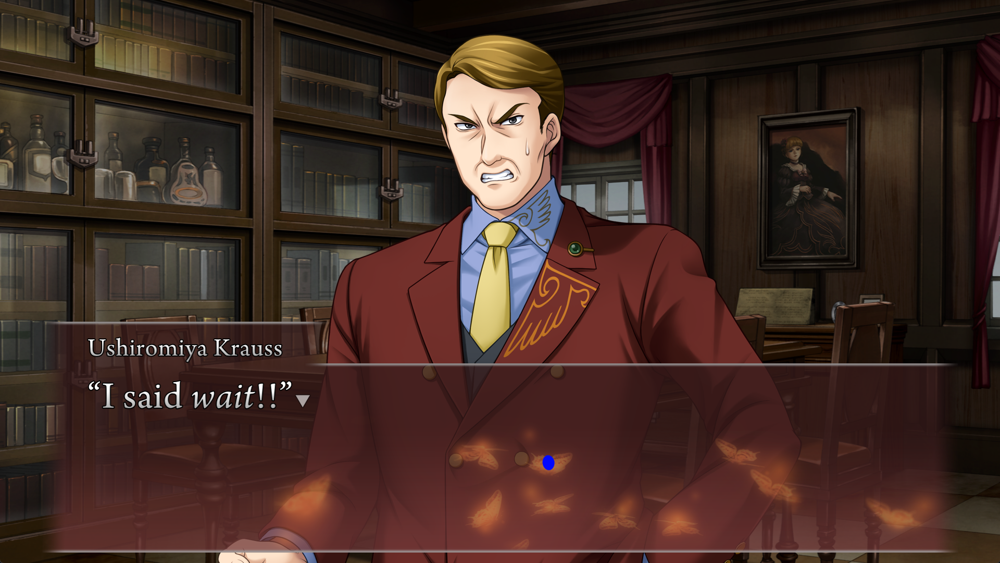
The VA doesn’t actually raise his voice very much for Umineko, but hey, I wouldn’t be me if I didn’t pay pedantic levels of attention to random formal stuff!
Krauss admits he’s been using Kinzo’s fortune as collateral and he would be in a very tight spot. Yep, we seem to be firing some of Chekhov’s guns right now. It turns out he’s been keeping his dealings secret from Natsuhi as well, investing in a dodgy themepark for the sake of honour. Oh, Krauss… he’s so funny…
Krauss: You need money to repay people! You need money to make money! You can’t even get started without money! And even the plan for this island would be proceeding smoothly if only there hadn’t been problems with the planning company!
I had the cooperation of government officials. I even had the governor’s personal guarantee that this would become the newest travel destination in the Tokyo Metropolis! The groundwork I laid was completely perfect!! Random chance and bad timing were against me! It was just a bit of bad luck. Like a traffic accident!!
I love how, in all timelines, there is one constant we can rely on: Krauss is a terrible businessman. In this case, Natsuhi can see—and he still can’t!—that he was taken in by a conman who he calls Hijikata-kun, who convinced him to invest in a nonexistent plan to develop the island.
Natsuhi: That’s what you said about the whole moon tourism thing!! You kept saying it was visionary, that it looked to the future, that it had high aspirations, and what was the end result?! Eventually, even you yourself admitted that it was utter nonsense!! I was sure something was wrong from the moment that strange man showed up claiming to be a high‐ranking NASA official!
I will give Lambdadelta this: she can certainly be funny. Krauss answers that with a full six-line textbox of justification, naturally.
(If you’re wondering, incidentally, modern space tourism begins in the mid-2000s with Scaled Composites, who soon became Virgin Galactic in 2005, a few years before this game came out. Later Blue Origin and SpaceX joined in. For decades, these companies only flew test flights; actual commercial tourist flights, either orbital or suborbital, have only happened in the last few years. It definitely wasn’t happening in 1986, and the only people who can attempt such vanity projects are the literal richest people on the planet.)
Safe to say that if he lived today, Krauss would be pouring the whole fortune into bitcoin or AI. But Krauss is just plain too misogynistic to even contemplate the idea that Natsuhi might be a better judge of character than him, so he can only double down.
Krauss: A woman like you can’t see into the future!!
Thankfully, Natsuhi comes out of her propriety shell to tell Krauss what-for. She gets Krauss to give her the economic rundown in her room, with all the servants told to keep silent about Kinzo.
To cover his tracks, Krauss signed over the deeds and power of attorney to someone else. “Reputable,” says Krauss, “economically literate men.” And if this is found out, he could face criminal charges.
Krauss is incredible… at this rate he’ll dig past the Kola borehole…
Still, Krauss promises, if they just wait a little longer, his land in Tokyo can be consolidated to build a huge tower! That will pay their debts and then some! Well, 1986 is the start of the bubble era, so Krauss might be right for once…
Natsuhi’s ‘wifely responsibilities’ mental track keeps playing, a single thought-terminator that says ‘support Krauss’. Krauss seizes on the epitaph ritual as the solution to his problems. And he’ll get Jessica to help with her child sense! …actually kind of surprised that Krauss is able to contemplate a woman having any insight into anything! It gets too much for Natsuhi and she has to leave the room.
She takes Genji’s key to the study and goes in there to cry. (Her having the key may be relevant later.) She hears Kinzo’s ghostly voice, and a vision of him comes to comfort her.
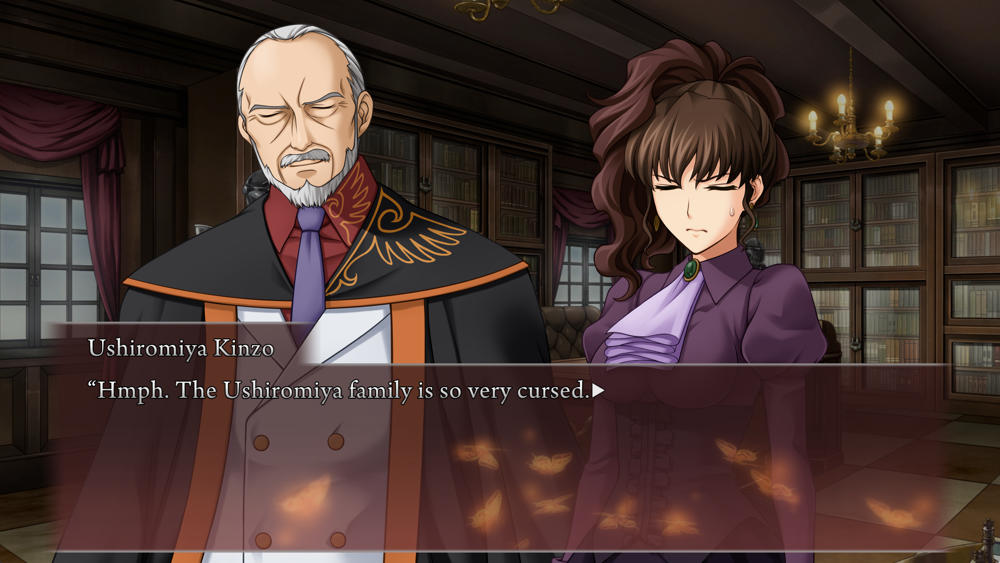
Yeah, that just about sums it up.
We go over a bit of Kinzo’s backstory. When he got the head, the elders were involved in a power struggle and broadly intended him to be a neutral puppet they could control. The war comes up. Kinzo talks about his time at war:
Kinzo: And then the war started. I was already tired of life at that point. I hoped to die on the battlefield, but I wasn’t sent to the front lines. ……However, the state of the war grew worse with every day, and the time for the decisive battle on the Japanese mainland seemed to grow ever closer. As bad as it might sound, I hoped that day would come quickly…
Yeah, we might be onto something with the nationalism/militarism thing for Kinzo.
So, Kinzo freed himself of all wordly attachments (Kinzo is the Buddha???) and met Beatrice in a mystical experience, which transformed him into a mad genius.
In order to truly succeed the headship and gain the aid of Beatrice, Krauss—or anyone else—must display a similar ‘spirit and conviction’, says Kinzo. Only übermenschen need apply! He calls over Beatrice to form in the room and affirm this. She does what she likes, she declares; and Kinzo in turn declares that he is the only one who can control her, thanks to his big willy… ahem, big will to power. (To be clear, Nietzsche is never explicitly invoked here; rather, Kinzo names absolute self-confidence and desire for power as the relevant qualities to make a head.)
In Fate terms, it’s all quite Gilgamesh. In Kill Six Billion Demons terms, you need to be the conquering king. And so forth.
Unfortunately, gender. Natsuhi is up there all resolutely declaring she will go forth and conquer, but Kinzo only wants a man to be doing that sort of thing.
He tells Beatrice that his last will is that she should use her judgement to decide who is the next head that she should serve… and she says she’ll help Natsuhi. But she cannot give her the gold outright: by contract, it only goes to whoever solves the epitaph.
I guess Beatrice’s magic only came with a finite amount of gold…
We jump forward as Natsuhi lays out her plan. As we all expected, Natsuhi’s plan is to cover up Kinzo’s death until the investment bears fruit. She describes it, though, as using magic to revive Kinzo… if everyone believes. Hahaha. Beautiful.
To dodge the autopsy revealing the time of death, the plan is… to bury Kinzo somewhere deep in the forest and announce his mysterious disappearance. Yep, beautiful. The chapter ends with an overt transition to a scene of Beatrice performing magic to revive Kinzo. So we’ll have more onscreen Kinzo after all! He seems pretty lucid this game though, not one yell of ‘BEATRIIIIICCCEEEEE’ yet.
Beatrice warns Natsuhi that the anti-magic toxin might destroy the magic. Which seems a way of saying that the ruse could be discovered. Natsuhi must ‘understand the laws of magic correctly’ to pull it off.
Magic, storytelling, performance, etc.
Natsuhi vows she will uses Beatrice’s power well.
The next chapter is titled A Proper Mystery, and it takes place at the 1985 family conference.
A new game is afoot!
I kind of expected the new ‘Game Masters’ to be a new character, but actually it makes a lot more sense for Bernie and Lambda to take over at this point.
So far, the game has seemed rather straightforward. We are shown both a mundane narrative and a magic narrative side by side, and the relationship between them is quite clear. I’m sure this won’t last, though!
In terms of new things we learned… well, this raises an interesting wrinkle, doesn’t it? In the previous four games, I’ve been assuming that piece!Battler is the authoritative POV. However, since Battler won’t be coming back to this game until quite late, and we’ve glimpsed that Bernkastel might have her own piece in the form of this mysterious blue-haired girl (an assumption, mind you), it’s kind of unclear whether we can believe anything we read just now.
That said, given that Kinzo is dead and his death has been covered up, it seems reasonable to think that something like this must have happened. Here, Natsuhi is credited with the idea to play ‘Weekend At Kinzo’s’. Perhaps she’s always the one to come up with the idea, or perhaps sometimes someone else comes up with it, but it seems Kinzo’s death and a coverup is a fixed point.
Everything seems to be rather heavily rigged to point the finger at Natsuhi, so I suspect there is a ruse and at some point we’ll get ‘Natsuhi is not a killer’ in red. We will see.
Otherwise, my initial question (new game or reprise of old game) has already been answered, so that’s neat!
From the ‘author!Beatrice’ reading, this makes even clearer the distance between ‘author!Beatrice’ and ‘character!Beatrice’. The latter is near-catatonic, but the former is evidently continuing the story, using other fictional agents to reveal whatever she intends to reveal.
Kay, I think that’s all from me for now! No sense speculating too much when we’re just getting started. I do kinda miss Ange though!
Comments